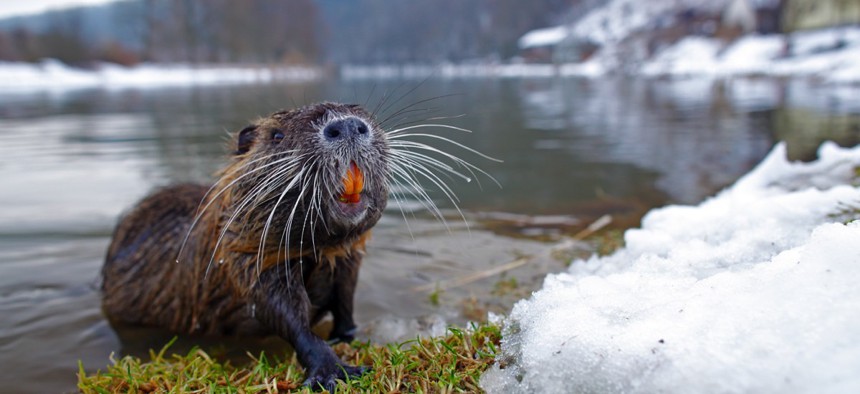Connecting state and local government leaders
More than 5,000 invasive species—from plants like cheatgrass to rodents like nutria—inhabit the U.S. causing about $120 billion in economic damage annually.
WASHINGTON — State wildlife officials this week called for increased partnership between federal agencies and state and local governments to better prevent, control and eradicate invasive species.
Invasive species are not native to the U.S., and when they infiltrate an ecosystem it can cause an array of problems, disturbing both the environment and local economies.
More than 5,000 invasive species now inhabit the U.S. causing about $120 billion in economic damage annually, according to the U.S. Fish and Wildlife Service. But the Invasive Species Advisory Committee, which provides recommendations to the U.S. Department of the Interior, recently concluded that federal agencies lack the authority to effectively combat that impact.
“As daunting as the task of managing invasive species can be, successful management is realistic and achievable through partnerships involving federal, state and county agencies; non-government organizations; land-grant universities; and, critically important, the private landowner,” said Slade Franklin, weed and pest state coordinator with the Wyoming Department of Agriculture.
Speaking before the Senate’s environment committee Wednesday, Franklin detailed Wyoming’s struggles controlling cheatgrass, a weed that consumes large amounts of water, degrades soil, displaces vegetation, and fuels catastrophic wildfires. The state’s 50-year fire cycle has been reduced to three years with the spread of cheatgrass, he said.
In the last 20 years, 74 percent of Department of Interior acres that experienced wildfires were on rangelands, and 80 percent of those 12 million rangeland acres had been invaded by cheatgrass, according to the Bureau of Land Management.
Cheatgrass is a winter annual that dies and fuels the fire cycle just as Wyoming’s other perennials—which feed the endangered greater sage-grouse among other species—are greening.
The National Interagency Fire Center reported that 2017 wildfire firefighting costs reached $2.9 billion across 10 million acres—$290 per acre. Farmers can treat cheatgrass for a mere $60 an acre, Franklin said, and they’re “passionate and financially motivated.”
Other efforts to tackle invasive species have recently gotten some congressional assistance. When Congress reauthorized the Water Resource Development Act in October, lawmakers included provisions targeting invasive species like Asian carp in the Great Lakes.
U.S. Sen. John Barrasso, a Wyoming Republican and the committee’s chairman, also put forth the WILD Act with ranking member Sen. Tom Carper, a Delaware Democrat, which has passed the Senate and contains additional measures for combating invasive species. The bill would require federal agencies working on invasive species projects to coordinate and offer grants to stakeholders for innovative controls like smart fish passage systems and advance DNA detection of invasives.
Joe Rogerson, program manager for wildlife species conservation and research at the Delaware Division of Fish and Wildlife, said more federal financial support is needed.
“States currently don’t have sufficient resources to tackle all of the threats outlined within their wildlife action plans, so we are unable to address threats facing fish and wildlife populations from invasive species,” he said.
One of the best examples of a federally supported eradication effort was the handling of nutria, a semi-aquatic rodent with large orange teeth native to South America, in the Chesapeake Bay region in the early 2000s, Rogerson said. A prolific breeder and voracious eater of grasses, nutria threatened to destroy 35 thousand acres of wetlands within 50 years—resulting in $35 million in economic losses due to the damage to tidal fish and shellfish nurseries.
Because of “adequate funding and staff resources,” all known populations of nutria are gone and not a single one has been discovered in the region in several years, Rogerson said.
Not all state officials at the hearing asked for increased federal funding and regulations. Terry Steinwand, director of the North Dakota Fish and Game Department, said his agency was seeking more funding from the state legislature through higher fishing license fees because that’s a “primarily state role.”
If his agency has any challenge it’s that of lacking the manpower for constant monitoring of high-value, high-risk areas with certain invasive species, he said, but federal collaboration has never been an issue.
Sen. Kevin Cramer, a North Dakota Republican, said that the reason his state might require less federal support is because there are fewer federal lands there than in Wyoming, which is more than 40 percent federal land.
Franklin said Wyoming would like to see parts of the National Environmental Policy Act improved to remove categorical exclusions for new invasive populations and treatments. Approval processes for new herbicides and other management tools also vary in length between federal agencies, which can slow control efforts.
“Some [agencies] can do that fairly quickly,” Franklin said. “Some take several years and millions of dollars to do the risk assessment.”
Dave Nyczepir is a News Editor at Route Fifty and based in Washington, D.C.

NEXT STORY: Economic Boom Hasn't Led to Economic Prosperity For All




